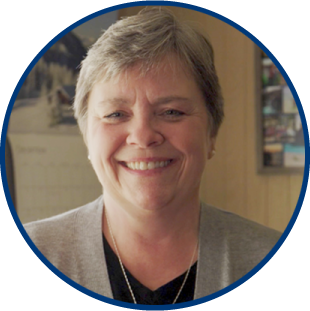
Diane Davis
Patient Testimonial

Diane Davis and her husband, Steve, live for their winters in Maine. They cherish every moment spent when their two adult children and two grandsons come to stay, and they look forward to family and friends’ annual visit to snowmobile hundreds of miles across the state to take in the scenic sprawling landscape. However, a dire cancer prognosis had Diane facing a harsh reality that she may not live to join in another of these cherished wintertime experiences.
Cancer has always been a part of Diane’s life having lost many family members to the disease. Her own fight started in 2010, when she was diagnosed with Stage I endometrial cancer and underwent a complete hysterectomy. Unfortunately, her battle with cancer did not end there as illness re-entered her life seven years later.
In January 2017, her gynecologic oncologist, Dr. Christopher Darus, discovered a softball-sized tumor in her ovary that had metastasized into the surrounding tissues and into her bowels. Diane was informed she had another cancer, but this time it was an advanced-stage ovarian cancer. Dr. Darus removed her ovaries and 18 inches of her sigmoid colon because of tumor involvement and immediately started Diane on a standard chemotherapy regiment.
Three months after the surgery and after 3 cycles of chemotherapy, the cancer had grown back, spreading into Diane’s lymph nodes. It was a very ominous sign and Dr. Darus did not feel additional rounds of chemotherapy would benefit her.
The news stunned Diane, and she felt her world crumbling around her. She thought about her children and grandkids and wanted to be around to watch every milestone in their lives to come. With Steve by her side, they looked to her doctor for answers.
Dr. Darus began searching for clinical trials and sent her tumor biopsy to Caris for molecular testing to see if there was anything they were missing that only molecular profiling would show. Diane’s tumor was microsatellite instability high (MSI-H), which meant her tumor could respond to immunotherapy. This finding also bolstered Dr. Darus’ suspicion of Lynch Syndrome given her family’s cancer history.
“If we don’t look for these alterations that are unique in a patient, we’re never going to find them. It’s about finding the right drug, for the right patient, at the right time,” says Dr. Darus.
Caris molecular profiling detected the microsatellite instability and revealed the presence of the BRCA2 mutation, which was a surprising discovery, and another biomarker target they could exploit for future therapies. It opened up new treatment options for Diane that would not have been known otherwise.
“Molecular profiling is looking for out-of-the-box targets and this is a perfect example of how sometimes thinking outside of the box can be very helpful,” explains Dr. Darus. Diane started immunotherapy treatment in June 2017 and by August, just three months later, her tumor was gone and the cancer in her lymph nodes shrunk considerably. “Now doctors can look at what is going on with you genetically and then make a treatment plan instead of waiting until something fails,” says Diane. “For me the future is so much brighter.”
Diane went from having no real treatment options for her cancer to having multiple treatment options with the use of molecular testing. Fortunately, she remains NED (no evidence of disease) but if that should change, she is more confident in her future today. She encourages all patients to have their tumors undergo molecular profiling, saying, “When my cancer didn’t respond to chemotherapy, my prognosis was very bleak. With the molecular profiling done by Caris, my doctor was able to pinpoint treatment that would work best for my individual situation, which thankfully proved successful. Molecular profiling is so critical – information is such power.”
Discover
More
Knowing what cancer looks like at the molecular level can lead to better treatment options.
